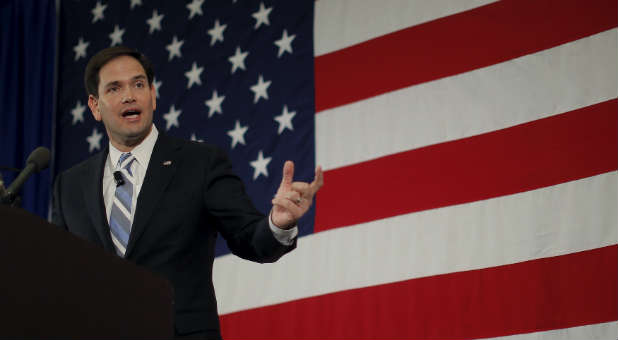Marco Rubio’s Playing the Isolationist Card Against Opponents
After seeking attention by claiming special expertise in foreign policy, GOP presidential wannabe Marco Rubio finds himself under fire because of his neoconservative ideology. He’s responded in the usual way for someone whose policies would keep America perpetually at war: accuse his critics of being “isolationists.”
Trying to defend his record of supporting such disastrous misadventures as Iraq and Libya, he denounced unnamed foes who sought “to derail the postwar consensus about America’s role in the world.” This outrageous yet anonymous “they,” he added, “will never call themselves isolationists, but that is exactly what they are.”
Against Ted Cruz, the likely intended target, the claim obviously is nonsense. After all, Cruz recently proposed carpet-bombing the Islamic State.
What Rubio unintentionally illustrated was the fact that “isolationist” today has been stripped of almost all meaning to become an all-purpose epithet. Indeed, if “isolationist” means anything today, it simply is “you don’t want to intervene where I want to intervene.”
There are no isolationists in America today, or at least any seriously involved in influencing foreign policy. Even the strongest critics of Rubio’s militarism tend to promote free trade, liberal immigration, and international cooperation. That’s hardly “isolationism.”
And most everyone is for at least some military action. The number of analysts who opposed social engineering in the Balkans, nation-building in Afghanistan, democracy-promotion in Iraq, and humanitarian intervention in Libya would fill a Washington phone booth, if one could be found.
Perhaps the greatest irony is how Rubio and his fellow neoconservatives parade as internationalists even as their policies disrupt the international order. Indeed, it is a curious internationalism which views itself as in full flower when the U.S. military is bombing, invading, and occupying other nations.
In Rubio’s form of internationalism the first and usually only solution to foreign problems is military. Anything else—diplomacy, economic sanctions, even threatening future military action—is the worst form of “appeasement,” another meaningless yet all-purpose insult.
Certainly doing nothing is utterly inconceivable—no handing off the problem to those states with the greatest interest.
A better definition for isolationist would be someone who wants America to be isolated. The starting point would be military—no alliances, of course, but also no other cooperation of any sort. There actually aren’t many of those people around, even among non-interventionists.
Next would be economic isolation, or autarchy. No imports, which in practice would mean few exports (you can’t wall off other nations’ products and expect them to welcome yours). It’s an ancient yet stupid economic policy held by few in America, even among avowed protectionists.
Then there is immigration. Even Donald Trump is at most a selective isolationist in this regard, targeting Muslims, and for reasons other than an abstract desire for Americans to be alone. Much of the broader immigration debate is centered on low-skilled people coming from poorer nations, especially Mexico. There just aren’t many real isolationists even regarding immigration.
Who are the dread “isolationists” among the GOP aspirants who Rubio reviles? They don’t exist. None of them believes in an isolated America.
Thus, it would be more helpful if Rubio dropped the name-calling and participated in a serious debate over how the U.S. should engage the world. That should begin with examining the catastrophic consequences of the military policies which he supported in Iraq and Libya.
Moreover, given his apparent determination to do something about the horrid Syrian civil war, Rubio should explain if there was a war anywhere he didn’t believe the U.S. had to get involved in and, if so, why?
Indeed, Rubio might discuss whether he believes peace itself to be “isolationist.” For instance, he declared: “I will use American power to oppose any violations of international waters, airspace, cyberspace or outer space.” Any violations?
He also promised to treat as a casus belli “the economic disruptions caused when one country invades another, as well as the chaos caused by disruptions in choke points such as the South China Sea or the Strait of Hormuz.” Does that mean America has to fight any war involving any trading partner?
When it comes to Rubio, “isolationist” really means good old-fashioned common sense. Don’t go to war unless you have to. Don’t risk your own people’s lives and money in misbegotten crusades abroad. Especially when none of those issues struck you, like Rubio, as vital enough to impel you to serve in the military.
Far from highlighting Rubio’s qualifications for the presidency, his foreign policy views demonstrate a worldview which is both simplistic and dangerous. When coming from the Florida Senator, “isolationist” should be viewed as a compliment.
Doug Bandow is a Senior Fellow at the Cato Institute. A former Special Assistant to President Ronald Reagan, he is the author and editor of several books, including Foreign Follies: America’s New Global Empire (Xulon).















































